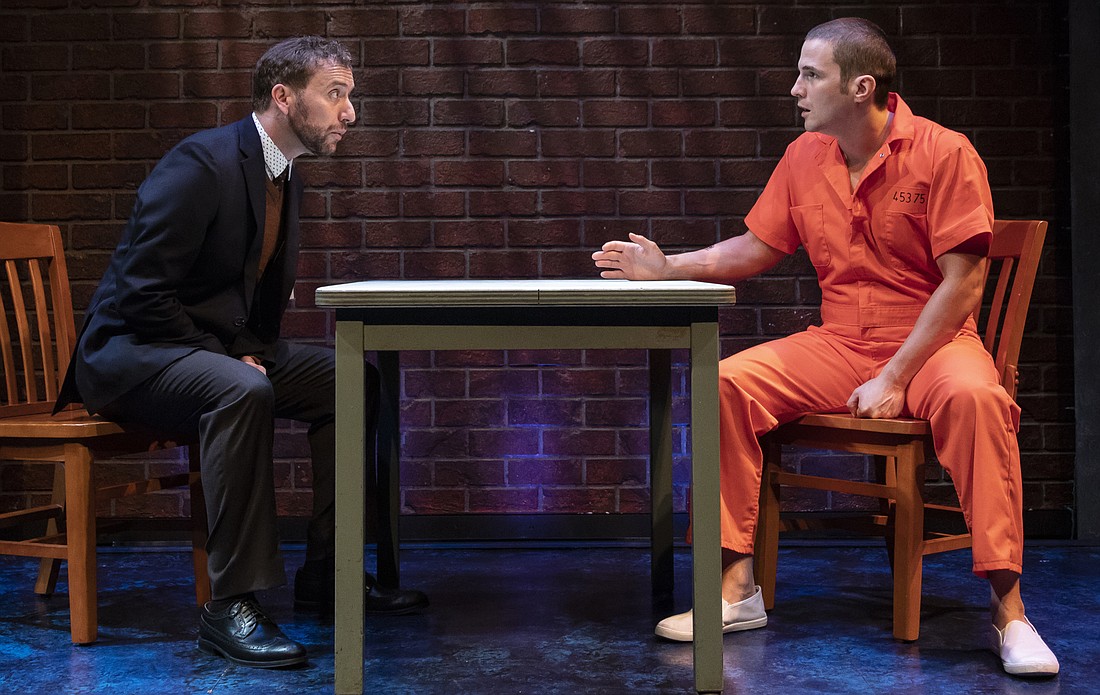- January 15, 2025
-
-
Loading

Loading

David Gow’s “Cherry Docs” offers a tale of crime and punishment in Florida Studio Theatre's latest Stage 3 production. The crime is a particularly vicious hate crime.
Mike (Tom Patterson) is the criminal. He’s a young, neo-Nazi skinhead living in Toronto. Mike kicks a restaurant worker to the point of death with his steel-toed combat boots — the cherry colored “Doc” Martens of the play’s title. His victim is a South Asian immigrant. Mike has no motive for the assault, aside from the man’s skin color. Mike’s attack is protracted — about two minutes or so. His victim dies a few days later from catastrophic injuries. I’ll spare you the gory details.
Canada’s Legal Aid Program assigns Mike a public defender. Danny (Drew Hirshfield) is a Jewish lawyer, and he’s as liberal as they come. He takes the pro bono case as a matter of liberal duty, but he loathes everything Mike stands for. At the start of the play, he loathes Mike.
They meet in the prison interview room. Before getting down to cases, they size each other up. Mike comes from a poor family. He may be poorly educated and brainwashed, but he isn’t stupid. Danny is highly educated, and proudly Jewish. Does Mike have a problem with a Jewish lawyer? No.
“You're a humanist, liberal Jew, so you gotta do your very best. In an ideal world, I'd have you eliminated. In this world, I need you more than anyone.”
Danny has zero sympathy for his skinhead client. But Mike’s right about him. Danny will do his very best to give him a fair trial. How?
Mike confessed, and his crime isn’t in doubt. The degree of punishment is. Manslaughter? Second degree murder? It all depends on motive. Why did he do it? How do you defend the indefensible?
Danny refuses to concoct a hollow defense strategy. He makes Mike create his own strategy. He hands Mike the legal ball — along with a sheaf of papers detailing his case history. Danny insists that Mike state his own case before the court. No boilerplate. No insincere repentance. Don’t tell the court what you think they want to hear. Tell the truth. Straight from the heart.
The performances are raw, gripping and honest. Patterson’s Mike is a human pit bull. He’s pumped up, edgy, twitchy and always on guard. To him, life offers two options: Bite or get bitten. In the initial interviews, he’s a threatening physical presence. You can see the wheels of his vicious mind turning, as Danny forces him to question his murderous ideology. Hirshfield’s Danny is a fighter in his own right. He plays against bleeding-heart type — and clearly wants to make Mike bleed when they first meet. Danny is also a man of faith. Defending a white supremacist tears his heart out. It also damages the bonds with Danny’s wife and fellow lawyers.
Nazism is bad. Aside from actual Nazis, we can all agree on that. But that’s not the point of Gow’s play. It’s a character study, not a Shavian polemic. “Why do people become Nazis?” is the first key question. “How can they stop being Nazis?” is the second.
Kate Alexander directs this gripping story with fire and ice. Gow’s play is a counterpoint of passion and brooding self-reflection. He alternates between monolog and dialog. Alexander follows the music of the script, and never gets into a predictable groove.
Despite its structural complexity, the play’s conflict is simple. Danny isn’t fighting for a “not guilty” verdict. He’s fighting for Mike’s redemption. He knows that Mike is guilty — and so does Mike. He knows what he did. Aside from hollow, racist slogans, Mike doesn’t know why he did it.
By forcing Mike to build his own case, Danny forces him to search his soul. That soul is infected with a virulent virus of hate, and he has to face it. Why did he kill an innocent busboy? He was drunk and a little high, but that’s no excuse. He didn’t mean to kill him. That’s also no excuse. So why did he kill an innocent man?
Ultimately, Mike’s ugly crime had a stupid motive. He was frustrated at his dead-end life and believed in white supremacist lies. It’s a painful thing to face. Mike’s redemption depends on whether he faces it.
What choice does Mike make?
Ah, that would be telling. But the playwright makes Mike’s life-and-death choices clear. Gow’s X-ray of the human soul is true to the bone. His glimpse of the war of light and darkness will touch your soul.